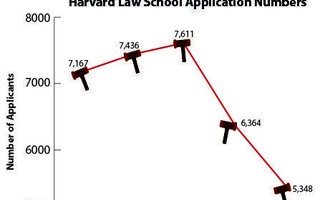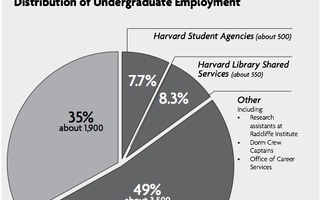The death of a University employee two years ago, a compensation ruling by the Industrial Accident Board, and a long series of legal appeals are the background for a pending Massachusetts Supreme Court decision which may have "a vital effect" on employment policies both at the University and elsewhere in the Commonwealth.
In November 1955, while working in a University Dining Halls kitchen, a chef cut his finger. Two months later he died of acute monocytic leukemia. When his widow applied for compensation, a member of the state Industrial Accident Board ruled that the chef's death was causally related to a staphylococcus infection resulting from the cut. Lawyers for Harvard have stated that medical information and "the judgment of most hematologists" do not support this position.
Ruling Expected Soon
University appeals so far have failed, and the decision was upheld by the full Board, and the Massachusetts Superior Court. A final ruling by the Supreme Court is expected within 45 days.
The case has been linked here to a growing tendency to blame employment for illnesses where no causal relationship exists. This existing tendency has made the present case "a matter of great importance" in determining employment policies, Dr. Dana L. Farnsworth, Director of University Health Services, said recently.
"Unfortunately, Massachusetts laws may force us not to employ people whom we want to employ," he continued. "If this tendency is not reversed, much harm may result to prospective employees who have disorders which are not disabling but may become so in the future."
Farnsworth and others are distressed because such employment policies would "severely handicap" workers with heart disease and other partial disabilities who are seeking jobs.
Read more in News
House Passes Bill on Import RestraintsRecommended Articles
-
A Closer Look at Employment PoliciesPresident Rudenstine has asked me to meet on his behalf with students involved with the Living Wage Campaign. I had
-
STUDENT APPLICATIONS FOR EMPLOYMENT GAINSeven hundred eighty-six students already have registered with the Student Employment Office for the coming year, according to Russell T.
-
The Harvard Works Progress AdministrationHarvard can and should be able to lay off employees when it has a legitimate reason to do so. Harvard is a private institution, and the number of employees it chooses to have is a matter of neither public policy nor popular consensus.
-
 HLS Application Numbers Defy National Trend for This Cycle
HLS Application Numbers Defy National Trend for This Cycle -
 Despite Tough Market, Harvard Law School Is Still a Safe Bet
Despite Tough Market, Harvard Law School Is Still a Safe Bet -
 Students Discuss Financial Benefits, Challenges of Holding Term-time Jobs
Students Discuss Financial Benefits, Challenges of Holding Term-time Jobs













